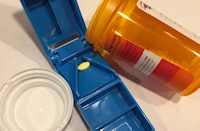|

Preparation
 Courses offered at
colleges of pharmacy are designed to teach students about all aspects of drug
therapy. In addition, schools teach students how to communicate with
patients and other health care providers about drug information and patient
care. Students also learn professional ethics, how to develop and manage
medication distribution systems, and concepts of public health. In addition
to receiving classroom instruction, students in Pharm.D.
programs spend about one-fourth of their time
learning in a variety of pharmacy practice settings under the supervision
of licensed pharmacists. The Pharm.D. degree has replaced the Bachelor of Pharmacy (B.Pharm.) degree, which is no longer being awarded. Courses offered at
colleges of pharmacy are designed to teach students about all aspects of drug
therapy. In addition, schools teach students how to communicate with
patients and other health care providers about drug information and patient
care. Students also learn professional ethics, how to develop and manage
medication distribution systems, and concepts of public health. In addition
to receiving classroom instruction, students in Pharm.D.
programs spend about one-fourth of their time
learning in a variety of pharmacy practice settings under the supervision
of licensed pharmacists. The Pharm.D. degree has replaced the Bachelor of Pharmacy (B.Pharm.) degree, which is no longer being awarded.
The Pharm.D. is
a 4-year program that requires at least 2 years of college study prior to
admittance, although most applicants have completed 3 years. Entry
requirements usually include courses in mathematics and natural sciences,
such as chemistry, biology, and physics, as well as courses in the
humanities and social sciences. Approximately two-thirds of all colleges
require applicants to take the Pharmacy College Admissions Test (PCAT).
Prospective pharmacists should have scientific aptitude,
good communication skills, and a desire to help others. They also must be
conscientious and pay close attention to detail, because the decisions they
make affect human lives.
In community pharmacies, pharmacists usually begin at the
staff level. In independent pharmacies, after they gain experience and
secure the necessary capital, some become owners or part owners of
pharmacies. Pharmacists in chain drugstores may be promoted to pharmacy
supervisor or manager at the store level, then to manager at the district
or regional level, and later to an executive position within the chain's
headquarters.
Hospital pharmacists may advance to supervisory or
administrative positions. Pharmacists in the pharmaceutical industry may
advance in marketing, sales, research, quality control, production,
packaging, or other areas.
Admission
The American
Association of Colleges of Pharmacy (AACP) hosts the Pharmacy College Application Service,
known as PharmCAS, for students who are
interested in applying to schools and colleges of pharmacy. This
centralized service allows applicants to use a single web-based application
and one set of transcripts to apply to multiple schools of pharmacy.
Advanced Degrees and
Residencies
Many master's and Ph.D. degree holders do research for a
drug company or teach at a university. Other options for pharmacy graduates
who are interested in further training include 1-year or 2-year residency
programs or fellowships. Pharmacy residencies are postgraduate training
programs in pharmacy practice and usually require the completion of a
research study. There currently are more than 700 residency training
programs nationwide. Pharmacy fellowships are highly individualized
programs that are designed to prepare participants to work in a specialized
area of pharmacy, such clinical practice or research laboratories. Some
pharmacists who run their own pharmacy obtain a master's degree in business
administration (MBA). Others may obtain a degree in public administration
or public health.
Areas of graduate study include pharmaceutics and pharmaceutical chemistry
(physical and chemical properties of drugs and dosage forms), pharmacology
(effects of drugs on the body), toxicology and pharmacy administration.
Licensing
A license to practice pharmacy is required in all states,
the District of Columbia, and all U.S. territories. To obtain a license,
the prospective pharmacist must graduate from a college of pharmacy that is
accredited by the Accreditation Council for Pharmacy Education (ACPE) and
pass an examination. All states require the North American Pharmacist
Licensure Exam (NAPLEX), which tests pharmacy skills and knowledge, and 43
states and the District of Columbia require the Multistate Pharmacy
Jurisprudence Exam (MPJE), which tests pharmacy law.
Both exams are administered by the National Association of
Boards of Pharmacy. Pharmacists in the eight states that do not require the
MJPE must pass a state-specific exam that is similar to the MJPE. In
addition to the NAPLEX and MPJE, some states require additional exams
unique to their state. All states except California currently grant a
license without extensive reexamination to qualified pharmacists who
already are licensed by another state. In Florida, reexamination is not
required if a pharmacist has passed the NAPLEX and MPJE within 12 years of
his or her application for a license transfer. Many pharmacists are
licensed to practice in more than one state. Most states require continuing
education for license renewal. Persons interested in a career as a
pharmacist should check with individual state boards of pharmacy for
details on examination requirements, license renewal requirements, and
license transfer procedures.
 Accredited
Programs Accredited
Programs
The Accreditation Council for Pharmacy Education (ACPE) is the accreditation
agency recognized by the U.S. Department of Education to accredit
professional degree programs in pharmacy. Pharmacy programs grant the
degree of Doctor of Pharmacy (Pharm.D.), which
requires at least 6 years of postsecondary study and the passing of a state
board of pharmacy's licensure examination. Be sure to confirm that any
program you are considering is accredited by ACPE.
Note: Some resources in this section are provided by the US
Department of Labor, Bureau of Labor
Statistics.
|